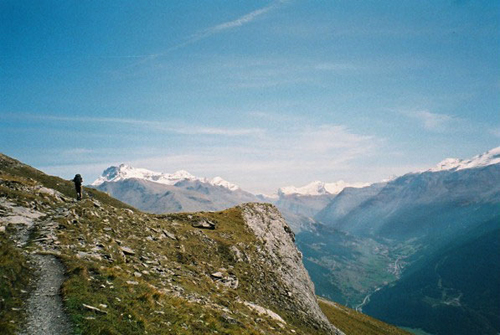This second walking holiday-inspired repost from ye olde blog, a meditation on different perspectives on, and responses to, natural grandeur.
“Don’t these mountains make you think of God?”
I was asked this question by one of my walking companions as we lunched in front of a particularly awe-inspiring Alpine vista, on my recent excursion in the Vanoise National Park.

I paused, considering the most appropriate way to respond, before deciding that honesty was the best policy.
“Not really, no.”
My inquisitive companion is a good friend of mine from University, and an evangelical Christian. He was also, by way of a somewhat heated discussion on the virtues of radiometric dating on an earlier walking holiday, one of the people who first made me aware of the widespread sympathy for literalist biblical creationism amongst even moderate-seeming evangelicals. Fortunately, this conversation petered out good-naturedly (I don’t always pick fights for the sake of it), but it bothered me, I think because in some ways it encapsulates the tension between science and (some) religion.
As I was looking at those mountains, I was thinking of how millions of years ago, the limestone I was sitting on was slowly being formed in a shallow, long-vanished sea, before the ongoing collision between Africa and Europe forced it a mile up into the air, scrunching the beds up into crazy folds. I was taking in the myriad signs that the glaciers currently confined to the very highest peaks once carved out all the valleys we were looking upon, evidence of the waxing and waning of Quaternary glaciation. I was considering how, over millions of years, all of those peaks and cliffs would be ground back down to sea-level, just by the action of ice and water.
Purple prose aside, all this has a tendency to overwhelm thoughts like, “What pretty mountains God has made for me!” For a start, I know enough to be aware of the overbearing hubris in the notion that The Alps were put there for my benefit. They were here before our great-times-10 000-grandparents had sorted out bipedalism; they will still be here uncounted generations after we, and possibly our entire species, are dead. Yet despite that vast lifespan, the entire cycle of the birth and death of a mountain range represents only a tiny fraction of the history of our planet. That’s enough to prick anyone’s pretensions of grand cosmic importance, even without considering our decidedly non-privileged status in the Universe at large.
And herein lies the problem for many people. They don’t like to feel small and insignificant, and they certainly don’t like the theological implications of being such a tiny part of a universe so mind-bogglingly old and large and alien: namely, that if there is a God that set the whole thing in motion, it is just as mind-bogglingly vast and alien – and it may not consider us to be particularly important. For many people of faith, and evangelical Christians especially, the idea of a personal relationship with God is central to their lives; how can they feel close to such a distant and incomprehensible being?
(The ironic paradox, of course, is that this is exactly the fall-back excuse for the whole theodicy problem – bad things happen to good people because ‘God moves in mysterious ways’).
I wonder if this tension is the root cause of many of the characteristics of the modern evangelical: the suspicion or even outright denial of science, particularly evolution and geology; the biblical literalism (God is hardly detached and aloof in the Old Testament, is he?); and the readiness to see the presence of God in every innocent mountain (whilst pitying people like me, who don’t).
Fortunately, the mountain doesn’t care. It just is.



Comments (8)